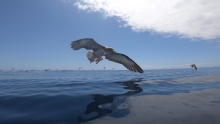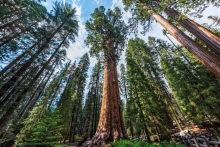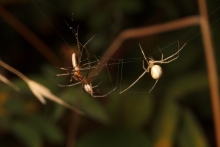Biological invasions are a major threat to ecosystems, biodiversity, and human well-being, resulting in ecosystem degradation and causing economic costs in the multi-trillions of euros globally. A study led by McGill University sheds light on the stark economic cost resulting from biological invasions in the European Union (EU).


Changes to the flow of the Labrador Current along the coast of Newfoundland and Labrador to Nova Scotia are leading to sudden warmings or drops in the oxygen levels of the waters in several regions including the St. Lawrence Gulf and Estuary. This change has dire consequences for marine ecosystems and fisheries. To better predict what could happen in the future, researchers from McGill University set out to answer the question: what controls the pathway of the Labrador Current?

Today McGill University, in partnership with Université du Québec à Trois-Rivières (UQTR) and the International Economic Forum of the Americas (IEFA) announced the launch of ‘Future-Charged: the Renewable Energy Revolution,’ this fall in Montreal.

Three more teams at the McGill Desautels Faculty of Management have been recognized for their exceptional commitment to sustainable workplace practices. The IT Customer Service department and the Bachelor of Commerce program have both earned Bronze Certifications, while the McGill Executive Institute earned a Silver Certification. Eleven teams across McGill University joined the Sustainable Workplace Certification program hosted by the McGill Office of Sustainability, five of which are from the Faculty of Management.

Scientists have been worried about the potential harms of microplastics for years. These small plastic particles less than 5 mm in length have been found everywhere because of plastic pollution – from the Earth’s deep oceans to remote regions in Antarctica, and even the seafood we eat. But, are microplastics really harmful?

Five offices across disciplines and campuses embrace sustainability at work and beyond through the Sustainable Workplace Certification program
What motivates sustainable change?

The ICI on recycle + program highlights organizations across Quebec committed to improving their waste sorting and reduction efforts
McGill is one of two Quebec universities to receive recognition from the provincial government for its waste management practices. RECYC-QUÉBEC, the branch responsible for sustainable waste management, recently awarded McGill’s downtown campus the Performance certification level of its ICI on recycle + program.

Cell biology researcher Dieter Reinhardt explains why his lab is cool with turning up the temperature of their freezers

Surveying the body sizes of Earth’s living organisms, researchers from McGill University and University of British Columbia found that the planet’s biomass – the material that makes up all living organisms – is concentrated in organisms at either end of the size spectrum.
The researchers spent five years compiling and analyzing data about the size and biomass of every type of living organism on the planet—from tiny one-celled organisms like soil archaea and bacteria to large organisms like blue whales and sequoia trees.
In 2017, the Donald E. Armstrong Building on McTavish Street, former home of the McGill bookstore, underwent extensive renovations, and it’s now the home of Desautels’ masters’ programs. Throughout the Armstrong building’s transformation, efforts were made to reduce environmental impact. Its energy efficiency was improved by 37% and water efficiency by 40%. McGill’s plans for the future are even more ambitious.

Learn how the McGill Master of Management in Finance (MMF) can open a number of career doors. On this Earth Day, we catch up with an MMF alumnus working in ESG and Sustainable Finance, Mitchell McEwen (MMF’20). Now Senior Manager, Enterprise Sustainable Finance, TD Bank Group, he first joined the Bank as an Environmental, Social, and Governance (ESG) intern. He credits the MMF program’s flexibility with allowing him to explore the intersection between finance and sustainability.


Climate anxiety is real, and sometimes it can feel overwhelming, but the key to addressing it is to stop dwelling and start doing. Business owners can do more than most. The McGill Sustainability Systems Initiative wants to help them do exactly that, writes Prof. Karl Moore for Forbes.com. Called PIVOT for short, the program is led by Prof. Dror Etzion, and it’s creating an online community where business owners can share and discover what others do.

CIBC has donated $1.25 million to the Sustainable Growth Initiative (SGI) at McGill University's Desautels Faculty of Management. CIBC's gift to the SGI will support a cross-faculty partnership between the Faculty of Agricultural and Environmental Sciences, Faculty of Arts, Faculty of Engineering and Faculty of Law to develop practical and actionable solutions for building a more sustainable economy.
We all need to wear clothing, but the environmental impact of purchasing clothing is significant, and a new initiative asks people to reflect on their own consumption. Participants in the New Clothing Detox Challenge refrain from clothing purchases during the month of March.
